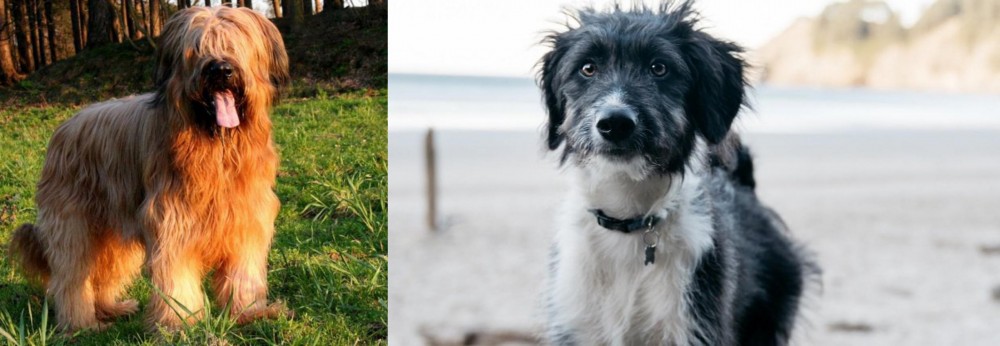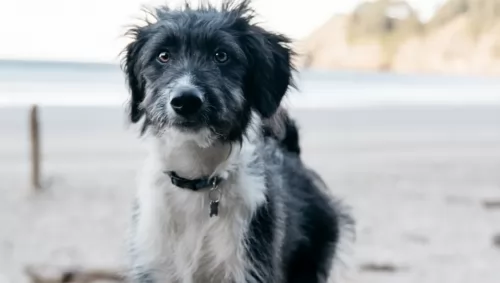 Petzlover
Petzlover Briard is originated from France but Bordoodle is originated from United States. Briard may grow 14 cm / 6 inches higher than Bordoodle. Briard may weigh 13 kg / 29 pounds more than Bordoodle. Briard may live 3 years less than Bordoodle. Briard may have more litter size than Bordoodle. Briard requires High Maintenance. But Bordoodle requires Low Maintenance
Briard is originated from France but Bordoodle is originated from United States. Briard may grow 14 cm / 6 inches higher than Bordoodle. Briard may weigh 13 kg / 29 pounds more than Bordoodle. Briard may live 3 years less than Bordoodle. Briard may have more litter size than Bordoodle. Briard requires High Maintenance. But Bordoodle requires Low Maintenance
 Through myth and legend, the Briard is thought to be a very ancient dog. A French herding breed, a Briard type of dog appears in writings as early as the end of the 14th century. According to legends the Briard was owned by Napoleon, Charlemagne, Lafayette and Thomas Jefferson. As a cross between the Barbet and the Beauceron, the Briard came into popularity following its appearance in a Paris dog show in 1863. Bred originally to guard and herd sheep, these intelligent, independent dogs were often left on their own. Because they both guarded and herded, their size and structure as well as their personalities were different from other dogs that worked sheep. Those that herded only were fast, agile and smaller. Those that only guarded were heavier, bigger and stronger. The Briard was in-between these two types of breeds. He was well suited to any kind of farm work and guarded the crops from the sheep’s desire to eat them. They moved the sheep from one grazing area to another and then to their holding area at night. No humans had to assist the Briard in this work once they were trained.
Through myth and legend, the Briard is thought to be a very ancient dog. A French herding breed, a Briard type of dog appears in writings as early as the end of the 14th century. According to legends the Briard was owned by Napoleon, Charlemagne, Lafayette and Thomas Jefferson. As a cross between the Barbet and the Beauceron, the Briard came into popularity following its appearance in a Paris dog show in 1863. Bred originally to guard and herd sheep, these intelligent, independent dogs were often left on their own. Because they both guarded and herded, their size and structure as well as their personalities were different from other dogs that worked sheep. Those that herded only were fast, agile and smaller. Those that only guarded were heavier, bigger and stronger. The Briard was in-between these two types of breeds. He was well suited to any kind of farm work and guarded the crops from the sheep’s desire to eat them. They moved the sheep from one grazing area to another and then to their holding area at night. No humans had to assist the Briard in this work once they were trained.
During World War 1, the Briards were drafted into service as messengers, sentries and search dogs for lost or injured soldiers. In that time frame the breed served almost to the point of extinction. Breeding programs following the war brought them back. Today the Briard is a home companion, a police dog, as well as both military and civilian search and rescue dogs.
 Known also as a Borderpoo or Borderdoodle, the Bordoodle is a designer- or hybrid breed which hails from the United States of America.
Known also as a Borderpoo or Borderdoodle, the Bordoodle is a designer- or hybrid breed which hails from the United States of America.
Both the dogs used in the development of this cross-breed are the Poodle and the Border Collie, and both these dog breeds have their own lengthy histories.
The history of the Bordoodle is short, as it is a modern crossbreed which has been purposefully bred by breeders to bring about a dog with certain looks and temperament.
 The Briard is a powerful, intelligent and independent working dog. They have a straight topline and their height is almost the same as their length. They have long, large, rectangular heads with wide muzzles. Their noses are also square and jet black while their side set, large eyes can be black-brown or black. Their ears have traditionally been cropped but with more countries outlawing it, they can now have natural ears set high on the head. They have a tail that is feathered and low-cut. The feet of a Briard are round, compact and large.
The Briard is a powerful, intelligent and independent working dog. They have a straight topline and their height is almost the same as their length. They have long, large, rectangular heads with wide muzzles. Their noses are also square and jet black while their side set, large eyes can be black-brown or black. Their ears have traditionally been cropped but with more countries outlawing it, they can now have natural ears set high on the head. They have a tail that is feathered and low-cut. The feet of a Briard are round, compact and large.
The Briard is a double coated breed with a long beard and mustache. Their hair completely covers the head and the eyes so that they are not seen. They have prominent eyebrows as well.
 The Bordoodle isn’t a purebred dog but is a cross between a Poodle and a Border Collie.
The Bordoodle isn’t a purebred dog but is a cross between a Poodle and a Border Collie.
He has a soft, medium length coat which is inclined to be wavy. Colors are essentially black and white but chocolate, cream, fawn, merle and grey are also seen.
He is a medium sized dog standing at between 38cm and 55cm and weighing between 13kg and 27kg. The long tail is feathery, the ears floppy or semi-erect and the brown eyes are bright and intelligent. The muzzle is medium to long.
As with any mixed breed dog, the Bordoodle can take after either parent dog but generally the Borderdoodle will be a medium sized dog.
With the Bordoodle you can expect nothing less than a highly intelligent dog. That is because both the Poodle and the Border Collie are super intelligent dogs so the Bordoodle is guaranteed to have got a good portion of this intelligence from both breeds.
It makes training and socialization easy for the dog. It is important for your Bordoodle to be trained and socialized if you want him to be obedient and relaxed around strangers and other pets. As it is, his amicable nature makes the hybrid dog of yours a great family pet – getting on well with other pets in the home as well as with children.
Apart from being such a smart dog, the Bordoodle is active, playful, loving and devoted – everything a serious dog owner wants in a pet. This is a dog that doesn’t really know the meaning of the word aggressive.
 As mentioned previously the Briard is intelligent and independent. They are also loyal, rugged, protective and bond intensely with their humans. They are often aloof when it comes to strangers or even when new furniture is introduced into the household. They have to learn that anything new into the family environment is friendly and good. They are great with children and susceptible to separation anxiety because of their deep affection for their people. Socialization for puppies is a must. This will let them know that people and children, other dogs in general are not harmful to their families. They have great memories and once they learn something – right or wrong – it is almost impossible to change it. They were bred to be independent thinkers who acted on their own conclusions. This is still true of the breed today, making them appear to be stubborn.
As mentioned previously the Briard is intelligent and independent. They are also loyal, rugged, protective and bond intensely with their humans. They are often aloof when it comes to strangers or even when new furniture is introduced into the household. They have to learn that anything new into the family environment is friendly and good. They are great with children and susceptible to separation anxiety because of their deep affection for their people. Socialization for puppies is a must. This will let them know that people and children, other dogs in general are not harmful to their families. They have great memories and once they learn something – right or wrong – it is almost impossible to change it. They were bred to be independent thinkers who acted on their own conclusions. This is still true of the breed today, making them appear to be stubborn.
They are great watchdogs, fearless and brave; willing to learn, eager to make you happy. They are basically gentle but that always runs up against their protective nature. A strong alpha leader is needed to handle this hard-working dog.
 Bordoodles have two great dog breeds to thank for the way they turn out. When you think of the Border Collie and Poodle, you know you’re going to get a dog that is friendly, social, playful, loving and devoted – the ideal family pet.
Bordoodles have two great dog breeds to thank for the way they turn out. When you think of the Border Collie and Poodle, you know you’re going to get a dog that is friendly, social, playful, loving and devoted – the ideal family pet.
Intelligent, he is easy to train too, and with excellent care, you’re going to have a most wonderful family pet and companion, full of fun and life.
 Being a large breed, the Briard shares many of the same health concerns as other large breeds. They have a few of their own as well. Typical issues for a Briard might include:
Being a large breed, the Briard shares many of the same health concerns as other large breeds. They have a few of their own as well. Typical issues for a Briard might include:
Progressive Retinal Atrophy/Degeneration –degeneration of the photoreceptors and retina.
 Bordoodles, when well cared for, can live to be 12-15 years of age. There aren’t going to be many health issues to contend with with your Bordoodle as there are no known health problems in this robust breed.
Bordoodles, when well cared for, can live to be 12-15 years of age. There aren’t going to be many health issues to contend with with your Bordoodle as there are no known health problems in this robust breed.
Nonetheless there are some common dog illnesses that you need to be aware of such as progressive retinal atrophy, hip dysplasia and hypothyroidism.
With hypothyroidism, the thyroid gland in the neck of your pet produces a hormone known as thyroxine that controls metabolism, but the disease hypothyroidism makes it that the gland doesn’t make enough thyroxine. Signs that your dog has this illness includes a dull coat, inflamed skin and even hair loss.
Get him to the vet immediately who will do blood tests and provide treatment. Mercifully it isn’t something that is life-threatening.
 It is best to feed the Briard smaller meals 2-3 times a day to prevent bloat. Feed 3-4 cups total for the day of a dry dog food that is high quality and made for large breeds.
It is best to feed the Briard smaller meals 2-3 times a day to prevent bloat. Feed 3-4 cups total for the day of a dry dog food that is high quality and made for large breeds.
Stationary Night Blindness – Congenital limited vision in the dark can vary from slight difficulty moving to complete inability to see in the dark.
Progressive Retinal Atrophy/Degeneration – Can lead to night blindness, limited or total blindness. Puppies with the disease can be blind before their first birthday.
Bloat (Gastric Torsion) – Stomach is distended and twists. Fatal if not treated quickly. Caused by eating a large meal quickly and either exercise immediately or drink a large amount of water right after eating.
Von Willebrand’s Disease – Blood clotting disorder leads to excessive bleeding. There is no cure, but it is manageable.
The Briard is a working dog and as such needs a job. They excel at agility, flyball, herding, obedience, confirmation and tracking. They need exercise and make excellent service dogs for people with disabilities and therapy dogs for those in emotional need.
 The Bordoodle is a dog which doesn’t shed that much so his grooming requirements are low and he is considered as a hypoallergenic dog.
The Bordoodle is a dog which doesn’t shed that much so his grooming requirements are low and he is considered as a hypoallergenic dog.
He will need to have his coat brushed at least twice a week to keep it shiny, soft and smooth. Depending on how your Bordoodle turns out, he may even require trimming at a professional groomer.
Make time to check his ears inside and out and learn how to clean the inside of his ears to avoid infection and wax build-up.
Dental hygiene is also imperative in dogs, and neglecting to do this will mean food particles and bacteria accumulating along your pet’s gumline, resulting in gingivitis and periodontal disease.
Every dog will require regular exercise and you can get your Bordoodle to join you in your walks. He is the kind of dog that can happily adjust to city or country life, but he will still need to have some ball games and other activities to keep him busy and happy.
He isn’t a dog that can be left alone day after day in the backyard. He is social and playful and loves the companionship of his human family.
If you feed your Bordoodle kibble from some of the top quality commercially produced foods, always research the dog food and take a good look at the ingredients.
The pet food you choose plays an important role in the longevity of your pet. There are commercially manufactured foods that have such poor ingredients that they can actually shorten your pet’s lifespan and cause stress to the kidneys and liver.
If in any doubt about what to feed your Bordoodle, speak to your vet. Cooked brown rice, cooked vegetables and cooked chicken can sometimes be mixed into your pet’s kibble. Raw meat should also occasionally be added in to ward off skin allergies.